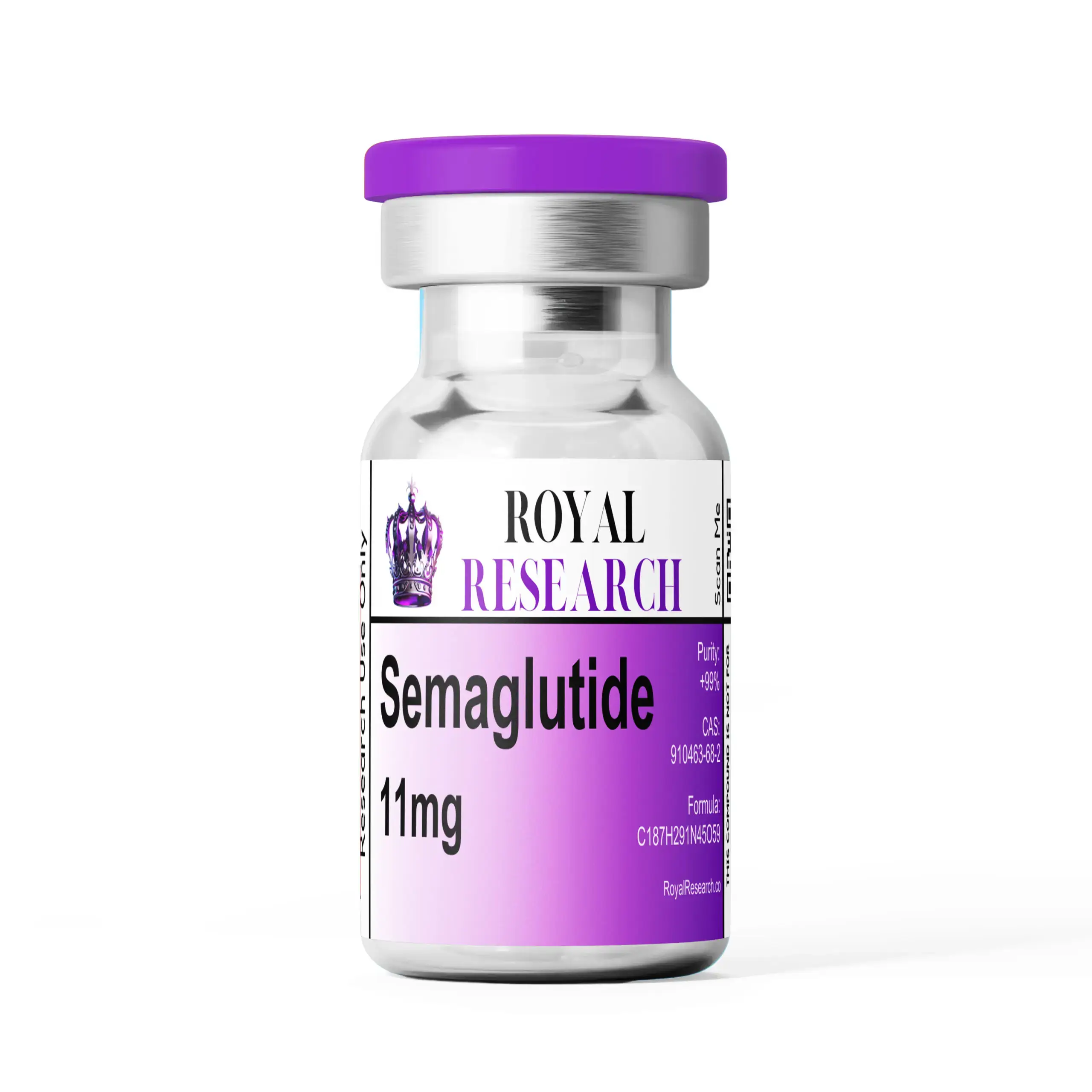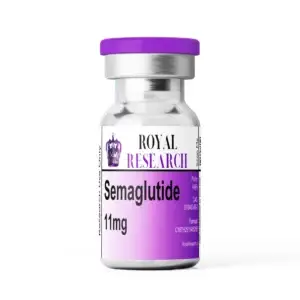Semaglutide 11mg
$216.99
9231 in stock



Semaglutide is a synthetic long-acting analog of human glucagon-like peptide-1 (GLP-1) composed of 31 amino acids: Histidine, Alanine, Glutamic acid, Glycine, Threonine, Phenylalanine, Threonine, Serine, Aspartic acid, Tyrosine, Serine, Isoleucine, Alanine, Tryptophan, Leucine, Valine, Glutamic acid, Glycine, Glutamic acid, Glutamic acid, Glutamine, Alanine, Alanine, Lysine, Glutamic acid, Arginine, Tryptophan, Leucine, Leucine, Glutamine, and Cysteine.
Peptide & Compound Information
Semaglutide 11mg/Vial
Chemical Formula: C62H98N16O22
Molecular Weight: 4144g/mol
Synonyms: Semaglutide; NN9535; 910463-68-2; UNII-53AXN4NNHX; NN 9535
PubChem: 56843331
CAS#: 910463-68-2
Total Amount of the Active Ingredient: 11mg (1 vial)
Shelf Life: 36 months
Buy Semaglutide Now with Quality Guarantee
Royal Research is all about trust and transparency when it comes to quality. We know your research is a big deal, and you need compounds that won’t let you down. That’s why each and every batch at Royal Research goes through independent third-party testing to verify its quality. Our go-to method is HPLC analysis, which we use to make sure our peptides and other compounds are as pure as we say they are. We believe your research deserves nothing but the best, so we aim for that kind of high purity with every product.
Transparency is a huge part of our quality assurance. We don’t just claim our compounds are top-notch – we prove it. How? By providing Certificates of Analysis (COAs) and lab reports openly for our products. We stand behind our compounds with transparent COA testing and share those results, so you can see the data yourself. No need to just take our word for it; the numbers are all there.
Here are the key ways Royal Research ensures quality for your peace of mind:
- Independent Lab Testing: Products are tested by a third-party lab (using HPLC and other advanced methods) to confirm identity and purity. This external verification means you can trust our results are unbiased and accurate.
- Ultra-High Purity: Our compounds, from popular research peptides, boast high purity levels. That means you’re getting clean, potent research products with no unnecessary contaminants.
- COA Transparency: We publish COAs for our products, giving you full visibility into the testing results. You can review the purity, composition, and quality data anytime – we’ve got nothing to hide.
In a nutshell, Royal Research makes quality assurance painless and worry-free. We handle all the heavy testing and verifications upfront, then share everything with you so you can feel confident in your purchase. And if by some rare chance something doesn’t measure up, you’d better believe we’ll make it right (your satisfaction and safety in research are our top priorities). With Royal Research, you’re not just getting research chemicals; you’re getting a trusted partner committed to exceptional quality, consistency, and honesty every step of the way.
Mixing Peptides & Compounds
Royal Research is recognized for its high-quality, third-party tested peptides and research chemicals that scientists can trust. If you have obtained a peptide or compound from Royal Research, you likely want to know the best way to mix it and calculate doses for your experimental setups. This overview will cover how to properly reconstitute your peptide vials and important points to consider regarding dosing. By following these guidelines, you can confidently handle your Royal Research products in the lab. (And as a heads-up, all products discussed are for research purposes only, not for human or animal use.)
Reconstituting Your Peptide
When you buy peptides online from Royal Research, it often arrives in a freeze-dried form inside a sealed vial. Reconstituting (mixing) the peptide is the first step before any dosing can be done. Here’s a simple guide:
- Clean and Prep: Ensure your work area is clean. Use an alcohol swab to sanitize the top of the peptide vial. Also, if you’re using a vial of diluent (like bacteriostatic water), clean its top as well. Sterility is key to avoid contaminating your research sample.
- Add the Diluent: Draw up the recommended type of water (sterile or bacteriostatic) into a syringe. Royal Research peptides come with bacteriostatic water, if sterile water is desired this would need to be acquired separately. BAC water is used for multi-use vials because it keeps the solution sterile longer. If your experiment will use the entire vial at once, sterile water is generally preferred. Slowly inject the liquid into the peptide vial. Aim the needle so the water runs down the inside wall of the vial, gently wetting the powder.
- Gentle Mixing: After adding the liquid, you can gently swirl the vial. Avoid shaking it hard. Most peptides will dissolve fairly quickly. If the powder is stubborn, let the vial sit at room temperature for a few minutes – do not heat it (heat can degrade many peptides). Generally you should see the solvent dissolve within a few minutes.
- Ready to Use: Once the peptide is completely in solution, you have successfully reconstituted it. Take note of how much liquid you added, because this determines the concentration of your solution. For example, if you added 1 mL to a 5 mg vial, your concentration is 5 mg/mL. Knowing this will be critical for the dosing step. If not using the entire solution immediately, label the vial and store it in the refrigerator. Most reconstituted peptides remain stable for at least a few weeks when kept cold (specific stability info can often be found in scientific literature or journals).
Peptide & Compound Availability: Vials, Capsules, and More
Royal Research caters to various researcher needs by providing products in different forms and combinations:
- Standard Vials: Most peptides and some hormones come in standard vials as a dry powder (for example, a 10mg vial of BPC-157 or a 6mg vial of Semaglutide). These require reconstitution with a diluent as described above. Vials are convenient for measuring out flexible doses; you’re essentially creating your own liquid formulation. They are also easy to store and ship.
- Capsule Products: Certain research chemicals or SARMs from Royal Research might be offered in capsule form. Each capsule has a specific dose (e.g., 10mg per capsule). This format is user-friendly because it ensures uniform quantity per capsule and reduces the chance of measurement error – you know exactly how much compound you're getting in one capsule. Some researchers prefer to dissolve capsule contents in a solvent to create a solution, whereas others might use them in pharmacological studies as-is (depending on the study design). Either way, capsules provide versatility.
- Combo Packs: Royal Research has bundles available, which are groups of related products sold together. For instance, a weight management bundle might include a vial of CJC1295 DAC and a vial of AOD9604 (two peptides often studied for metabolic effects). Another example could be a blend vial containing a fixed ratio of two peptides in one. Buying a bundle is a convenient way to obtain all components of a multi-faceted study at once. Plus, bundles may come at a discount compared to buying each item separately. Just be mindful that each compound in a bundle still needs to be handled according to its form (mix the vials, don’t mix capsules unless intended, etc.).
Research Use Only – Compliance and Safety
Finally, a crucial reminder: Royal Research products are for research use only and not for human use of any kind. This means they have not been evaluated by the FDA for safety or effectiveness in humans, and they are not to be taken as drugs or supplements. Any reference to dosing or effects is in the context of laboratory research (such as cell culture experiments or animal studies under approved protocols). As a researcher, you should:
- Use Proper Safety Measures: Wear gloves, lab coat, and eye protection when handling these chemicals. Use a biosafety cabinet or fume hood if appropriate.
- Dispose of Materials Safely: Follow your institution’s guidelines for disposing of vials, needles/syringes, or any leftover solution. Never simply throw them in regular trash or pour chemicals down the drain.
- Keep It Professional: Never attempt self-experimentation with research compounds. Not only is it dangerous, but it also violates the intended use of these products. The label “for research purposes only” is there for legal and ethical reasons – honor that.
- Stay Informed: Regulations can change, so stay updated on any legal requirements for possessing or working with certain research chemicals in your region. Royal Research provides these compounds with the expectation that buyers are qualified researchers.
By adhering to these rules and conducting your work responsibly, you ensure a safe environment and contribute positively to scientific knowledge. Royal Research is here to supply the tools you need – how you mix and dose them in the lab should always align with scientific best practices and safety standards. Happy researching!
Fast Shipping in the USA and Canada
USA – Delivery to All 50 States
Order Semaglutide 11mg vials online and enjoy fast, reliable delivery across the USA. Whether you're in New York, California, or Texas, we ensure your research peptides arrive quickly and securely. Most orders are processed in less than 24 hours and received within 2–5 business days. Shop now to experience the best in quality and service!
Canada – Quick Shipping Nationwide
Shop Semaglutide 11mg vials online with delivery to all provinces and territories in Canada, including Toronto, Vancouver, Montreal, and Calgary. With fast shipping and secure packaging, you can trust us to provide premium research peptides to your doorstep in 5-10 business days. Buy today for exceptional service and quality!
Disclaimer
The information provided above is not intended to substitute medical advice, diagnosis, or treatment. Should you have any questions regarding a medical condition, seek the advice of your physician or a qualified healthcare provider.
In no case should medical advice be disregarded or delayed because of what you have read or seen. We bear no responsibility or liability for your use of any of our research compounds and products. Please note that they are being sold for research purposes ONLY. We do NOT condone any personal use.
Note: In some cases wherein the assigned top colors are out of stock, a different top color will be used to ensure that your order will not be delayed. Should you need assistance identifying the peptide vial that you received, please send us an email at [email protected].
ALL ARTICLES AND PRODUCT INFORMATION PROVIDED ON THIS WEBSITE ARE FOR INFORMATIONAL AND EDUCATIONAL PURPOSES ONLY.
The products offered on this website are furnished for in-vitro studies only. In-vitro studies (Latin: “in glass”) are performed outside the body. These products are not medicines or drugs and have not been approved by the FDA to prevent, treat and/or cure any medical condition, ailment or disease. Bodily introduction of any kind into animals or human is strictly prohibited by law.
Additional information
| Weight | 10 oz |
|---|---|
| Dimensions | 0.2 × .2 × .2 in |





